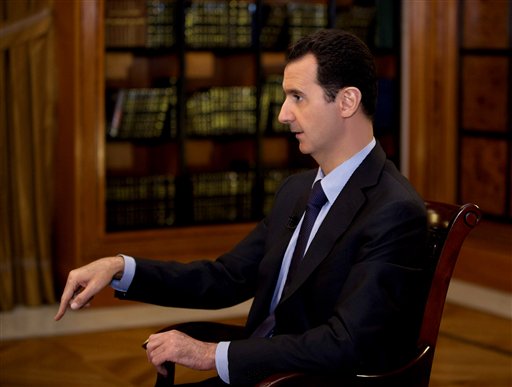Syrian president casts doubt on peace conference
Tuesday, October 22, 2013
 In this photo, which AP obtained from Syrian official news agency SANA and which has been authenticated based on its contents and other AP reporting, President Bashar Assad gestures as he speaks during an interview with Lebanon's Al-Mayadeen TV at the presidential palace in Damascus, Syria, Monday, Oct. 21, 2013.
In this photo, which AP obtained from Syrian official news agency SANA and which has been authenticated based on its contents and other AP reporting, President Bashar Assad gestures as he speaks during an interview with Lebanon's Al-Mayadeen TV at the presidential palace in Damascus, Syria, Monday, Oct. 21, 2013.BEIRUT - Syria's president cast doubt Monday on the chances of holding a long-delayed international peace conference to end the country's civil war, saying the factors that would help such talks succeed do not currently exist.
The United States and Russia have been trying for months to convene a conference in Geneva to negotiate a political solution to a conflict that has killed more than 100,000 people and forced some 2 million more to flee the country. The U.N. chief has set mid-November as a target for the proposed gathering, but both Damascus and the opposition are skeptical and no final date has been announced.
President Bashar Assad brushed aside the renewed efforts to coax the government and its opponents to the negotiating table, telling Lebanon's Al-Mayadeen TV in an interview that "the factors that would help in holding it (the conference) are not in place if we want it to succeed."
He said it's not clear who would represent the opposition, or what credibility the opposition's representatives would have inside Syria.
"Who are the groups that will participate? What is their relation with the Syrian people? Do they represent the Syrian people or they represent the country that made them?" Assad asked, alluding to his government's claim that the rebels are agents of Western and Arab powers. "There are many questions about the conference."
For its part, Syria's fractured opposition has yet to decide whether to attend the proposed Geneva conference.
The main Western-backed opposition umbrella group, the Syrian National Coalition, is scheduled to meet Nov. 1-2 in Istanbul to decide whether to take part in the talks. One prominent faction within the Coalition, the Syrian National Council, has said it has no faith in negotiations with Assad's regime and won't participate in any Geneva negotiations.
The ability of the Turkey-based Coalition to speak for the broader rebellion has long been in dispute, and fighters inside Syria - many of whom reject negotiations with the regime - have accused the opposition leaders in exile of being out of touch with reality on the ground. The Coalition's already strained credibility took a major hit last month when nearly a dozen prominent rebel groups publicly broke with the opposition umbrella group. More rebel brigades have since followed suit.
Assad, meanwhile, has managed in the past six months to restore a sense of stability to his government's hold on power, shaken by losing large chunks of the country to the rebels in 2012.
Dressed in a blue suit and exuding confidence, Assad used much of the interview to denounce Saudi Arabia, Qatar and Turkey for supporting the rebellion against him. But he also addressed the issue of his future in the country and presidential elections planned for 2014.
"I don't see any reason that prevents me from running for the next elections," he said. "It is still early to talk about it. We can only discuss it at the time when the presidential elections date is announced."
Much of the opposition says no peaceful transition is possible unless Assad leaves power.
The president also said that he is willing to take part in peace talks, but reiterated his previously stated position that he will not negotiate with the armed opposition unless they give up their arms first.
International diplomatic efforts to broker a political resolution to Syria's civil war have stumbled repeatedly, while the violence inside the country has raged on, exacting a terrible toll on the civilian population.
Residents of one besieged rebel-held suburb of Damascus issued an urgent plea Monday for the international community to save them from starvation and constant bombardment after efforts to evacuate civilians from the area collapsed this week.
For months, government troops have blocked food and supplies from entering the suburb of Moadamiyeh west of the capital, activists say. Around 3,000 residents of the suburb were able to flee the area late last month during a rare, temporary cease-fire.
Aid agencies say Syrians across the country face difficulties getting food, but hunger in the rebel-held suburbs of Damascus, largely surrounded by government territory, is particularly acute.
In an open letter circulated by the opposition's Coalition, Moadamiyeh residents pleaded with the international community for help.
"Save us from death. Save us from the hell of Assad's killing machine," the letter said.
The Coalition called on international organizations to establish a humanitarian corridor to allow food into the area. On Saturday, the United Nation's humanitarian chief Valerie Amos called for an "immediate pause" in clashes to allow civilians to leave.
A spokesman for the Moadamiyeh council, Qusai Zakarya, confirmed that local residents had sent the letter to the Coalition asking for help.
"We are heading toward a definite destiny: starvation," he said via Skype, with the clap of shelling and the thumping of a helicopter audible in the background.
Activists from the Moadamiyeh Media Center reported that six people died of hunger in September.
Also Monday, Syrian opposition activists and state television said government forces killed a prominent army defector who became a rebel leader.
The British-based Syrian Observatory for Human Rights as well as the pro-government Al-Ikhbariya TV said Yasser al-Abboud was killed during fighting in the town of Tafas in the southern province of Daraa. Al-Abboud was among the first high-ranking Syrian army officials to defect and join the rebellion.
